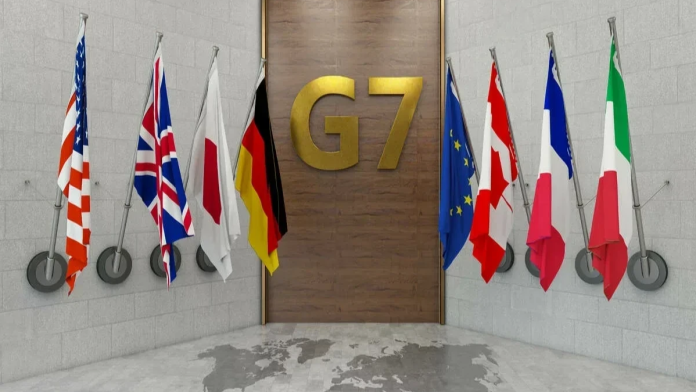The United States has urged the Group of Seven (G7) countries and the European Union to impose stronger penalties on nations that continue to buy Russian oil. Treasury Secretary Scott Bessent told G7 finance ministers that tariffs should be placed on countries such as India and China, which are purchasing Russian crude at discounted prices. He warned that these purchases are providing Moscow with the money it needs to sustain its war in Ukraine.
The call was made during a meeting of G7 finance ministers chaired by Canadian Finance Minister Francois-Philippe Champagne. The G7 is made up of the United States, Canada, the United Kingdom, Germany, France, Italy, and Japan. According to the Canadian presidency, the ministers discussed additional sanctions to increase pressure on Russia, including the possible use of frozen Russian assets to support Ukraine’s defense. They also reviewed trade measures such as tariffs aimed at countries that finance Russia’s war effort through continued oil purchases.
In a joint statement, Bessent and U.S. Trade Representative Jamieson Greer emphasized that only a coordinated global response could cut off the revenue funding President Vladimir Putin’s military campaign. They welcomed commitments made during the call to explore new sanctions and economic measures while speeding up talks on the use of immobilized Russian sovereign assets.
Venezuela increases reliance on USDT for oil sales as PDVSA seeks alternatives to blocked payments
US Targets India and China With Tariff Push
Earlier in the day, a spokesperson from Washington called on G7 and European Union allies to impose “meaningful tariffs” on imports from India and China. The United States argued that unless these two large buyers of Russian oil reduce their purchases, the sanctions already imposed on Moscow will not have their intended effect.
Washington has already acted against India on its own. President Donald Trump imposed an extra 25% tariff on Indian imports, raising total duties on some goods to 50%. Officials said this was designed to pressure New Delhi to cut back on its Russian oil purchases. However, the move has created tensions in trade relations between the two countries, which had been working on strengthening economic ties before the new duties were announced.
With China, the approach has been more cautious. While Beijing’s energy trade with Moscow is a concern for Washington, the Trump administration has not introduced additional tariffs on Chinese imports. The reason, officials explained, is that the United States is managing a delicate trade truce with China. Talks between the two countries also cover other sensitive issues, including technology ownership and anti-money laundering cooperation.
Canada lowers Russian oil price cap to $47.6 per barrel in coordinated sanctions
High-Level Talks and Growing Pressure
Treasury Secretary Scott Bessent is scheduled to travel to Madrid for talks with Chinese Vice Premier He Lifeng. The agenda includes trade issues, Washington’s demand for the divestment of Chinese-owned TikTok’s U.S. operations, and financial oversight matters. The Russian oil question is also expected to be a key topic.
Meanwhile, President Donald Trump expressed frustration with Russia during a television interview. He said his patience with President Vladimir Putin was running out but did not announce any new sanctions. Trump noted that penalties on banks and oil remain possible, but insisted that European countries must join in for the measures to be effective.
U.S. officials continue to stress that Russia’s primary source of revenue is its oil industry. They argue that without major buyers such as India and China, Moscow would face far greater financial difficulties. As a result, Washington is pressing its allies to take tougher action, warning that Russia could otherwise find ways to sustain its economy and prolong the conflict in Ukraine.


